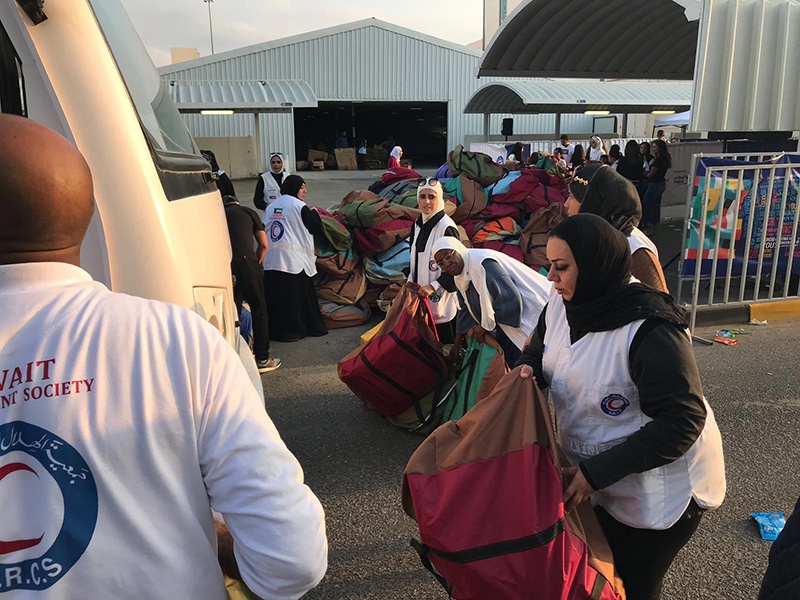
KUWAIT: The State of Kuwait, through its humanitarian organizations and diplomatic representation, continues to provide humanitarian aid throughout the globe, helping those who are in need, in cooperation with local partners in the region. Kuwait's humanitarian stance stemmed from the directives of His Highness the Amir Sheikh Sabah Al-Ahmad Al-Jaber Al-Sabah, a figure recognized as a world humanitarian leader by the UN.
In the Gaza Strip, a Kuwait-funded wastewater treatment station in Khan Yunis City in the southern Gaza Strip has commenced trial operation, the Palestinian Water Authority (PWA) said. The first phase of the project was launched in early 2017 with a capacity of roughly 27,000 cubic meters of water per day, the PWA's Chairman Mazen Ghuneim said in a press statement carried by the Palestinian News and Information Agency (WAFA).Funded by the Kuwait Fund for Arab Economic Development (KFAED), the plant costs a total $55 million, he said, adding that the facility would be officially launched in the first quarter of next year. The plant will contribute to providing treated wastewater to more than 200,000 people in Khan Yunis City, which has suffered so much due to poor basic services.
In Yemen, the International Islamic Charity Organization (IICO) has launched a solar-powered artesian water well project in Al-Bayda governorate in central Yemen at a total cost of $179,000. The communication foundation for human development said in a statement, that the implementation of this project is a lifeline for thousands of citizens and would reduce the drought and water scarcity in the city. This project will provide about 150,000 liters of clean drinking water daily for more than 100,000 people. In Yemen also, a free medical camp for ophthalmology, funded by Kuwaiti donors and supervised by Kuwait's Rahma International charity, benefited about 1,500 patients Al-Khokha district of Yemen's Hodeidah province Dr Ali Al-Ahdal, Director General of the Health Bureau in Hodeidah, said that the demand for the camp was very high, 1,500 cases of eye problems benefited from this project including 250 successful surgeries.
In Irbil, Kuwait continued to provide humanitarian assistance to Syrian refugees and displaced Iraqis in the Kurdistan Region of Iraq, as the Consulate General of Kuwait in Irbil, held a celebration presenting gifts to many children with special needs who are receiving treatment in one of the centers funded by Kuwait. Also in Irbil, two health centers providing health services to Iraqi refugees funded by (IICO) were opened in two camps near Irbil. The official of the Barzani Charitable Foundation, Musa Ahmad, said that the two centers were renewed, during which health support is provided to the Iraqi displaced people residing in the two camps, who are displaced from Mosul who were unable to return to their homes due to conditions. In camp, north-east of Irbil, food baskets were distributed to 473 Syrian refugees residing in the camp, as Kuwait had launched a relief project for Syrian refugees through the distribution of more than 1,000 tons of food provided by (IICO) in nine camps for Syrian refugees across the Kurdistan region of Iraq.
At the international level, Kuwait called for strategic partnership and supporting specialized programs to solve the root causes of the increasing number of refugees and displaced people in the world. This came in a speech by Kuwait's permanent representative to the United Nations (UN) and other international organizations in Geneva, Ambassador Jamal Al-Ghunaim before the meeting of the special committee of the United Nations High Commissioner for Refugees (UNHCR).
In his speech, Ghunaim said, "The world is going through a critical period of human history in which conflicts, wars and struggles have increased, resulting in waves of displacement and migration." Dealing with these challenges requires strengthening mediation efforts and resolving disputes through peaceful means as adopted at the World Humanitarian Summit in 2016, he added. He pointed out that the importance of holding this special meeting comes under the harsh and exceptional circumstances witnessed by the world, which requires supporting the efforts of UNHCR to ensure the protection and safety of the most vulnerable people.
In Kuwait, the Kuwait Red Crescent Society (KRCS) launched a 'warm winter' campaign for the cleaners, as they distributed 3,750 winter bags that will provide warmth to these workers in various industrial and commercial sectors. The bags containing various needs of clothing, blankets and winter necessities, as number of volunteers and children took the process of distributing on workers, in recognition of their work nature, which obliges them to stay in the streets in a cold and harsh climate. - KUNA




